An Intro to SummerCamp NYC 2018
Part of a two-part series introducing SummerCamp NYC 2018. Also published on Medium here.
Part 1: Meeting the Group of 2018
SummerCamp is a community of Harvard interns in the Bay Area, NYC, Seattle, and now Boston who come together every year to celebrate innovation and technology, focusing on the students and companies at the heart of it all. Through professional and social events, the group aims to connect students with each other, their alums, and leading technology-related companies in the area. Partly because hanging out with friends, attending fun summer events, and networking with professionals encompasses a lot of what a college student could ask for, SummerCamp has grown over the last four years with over 900 memberships. Past company partners have included VC firms and their portfolio companies, as well as established institutions like Google, Facebook, Bridgewater, and Two Sigma.
As one of the organizers for the NYC team, I wanted to introduce the group not only through its goals and motives, but also by looking into 2018’s community of interns. For any students reading this, hopefully you get a better picture of your fellow interns in the NYC area this summer. For companies and potential partners, I’m hoping this is a nice intro into what SummerCamp is about, while also giving more information about what to expect regarding the people (read: interested talent pool) that’ll be attending your events–also of course motivating future participation. And finally for anyone else, I’m not sure how entertaining this will be, but hopefully you learn something new :)
Hi, I’m ___, live in ___ house, and study ___
This year we had over 400 sign-ups as of May 24, 2018, with just over 100 interns working in the NYC area. While most will be in finance or consulting-type roles, there’s also a large amount of software engineers, along with representation in everything from data science and machine learning to volunteering in hospital clinics.
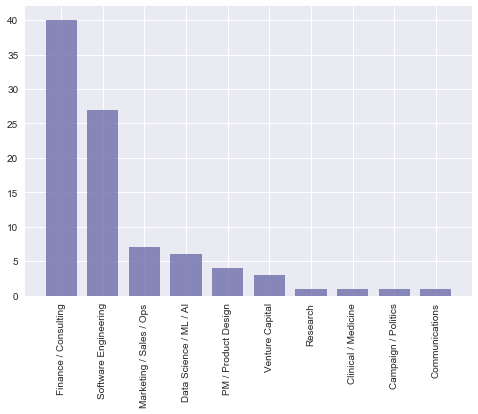
While it had a good run on top, CS50 was less popular than Ec10a (the intro Econ class) among undergrads for the last two years, and it seems like Harvard interns still can’t escape the allures of finance and consulting.
Related to this concentrated diversity are the students’ fields of study. Among Harvard’s 49 concentrations, 27 of them were represented in the cohort. This time Computer Science dominated with 39% of all interns, more than any other concentration in the top five most popular majors, which were rounded out by Applied Math, Math, Economics, and Statistics. Each field contributed to 14%, 8%, 6% and 5% of all concentrators respectively1.
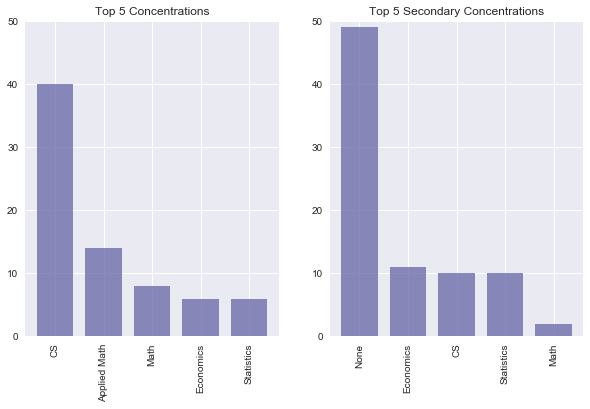
Additionally, while 48% of all interns were not explicitly pursuing a secondary concentration (minor), as far as academic interests went the most popular fields of study were similar to the primary concentrations. Economics, Statistics, and Computer Science were again strongly represented.
In fact, when looking at the company roles again but binned by major2, we see that Computer Science concentrators largely make up SWE and data science / ML roles (surprise, surprise), but also end up as the second largest group going into finance / consulting, which was relatively uniform across concentrations. While it’s possible that more quantitative roles in finance / consulting might favor a CS background, it’s nonetheless good to note that what Harvard students study does not necessarily dictate what they do internship-wise. Groupthink? A name-brand school? Maybe it’s just that with a great liberal arts education comes the great possibility of needing to prepare outside of class for interviews, regardless of major :).
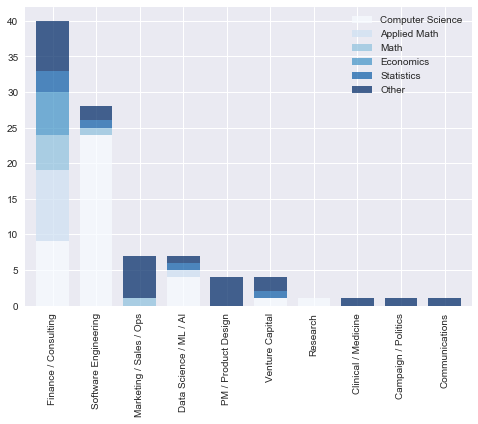
By nature, SummerCamp is more well-known among the STEM (particularly applied math and CS)-oriented crowd. Internships in finance and tech also seem to be the most sought out in a place like New York. And so while college is a place to learn, it’s also no surprise that majors related to those jobs end up the most popular.
On the topic of career prospects, while we’re far from the goal of registering every tech-interested Harvard intern working in New York, the most popular companies associated with SummerCamp right now are far from shockers. Harvard kids tend to like big cities, big tech and big finance.
| Company | Number of Interns |
|---|---|
| Goldman Sachs | 13 |
| 6 | |
| 4 | |
| Bridgewater | 3 |
| Bank of America | 3 |
Finally, breaking down students by age demographic results in a nicely symmetrical distribution, probably the result of rising senior and junior summers offering the most opportunity to work in the city for students. Because hanging out with alumni is always fun, SummerCamp is also open to recent grads, which saves it from the right-skewed age distribution of those looking for nearer-term future employment.
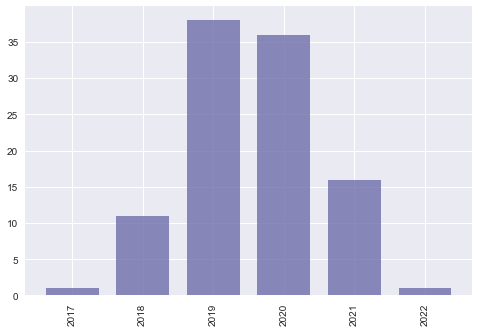
One eager prefosh… SummerCamp requires a harvard.edu email to sign up, but since Harvard gives prospective students their college emails at the end of high school, it’s possible to sign up without having attended the college yet.
Revisiting intern roles with a focus on age distribution, we can see more rising senior and junior majority especially in finance or consulting roles (42.5% and 45% respectively). Again a couple factors might account for this, but if companies are looking to hire from their intern classes, it makes more sense to open internships to students within one or two years of graduation.
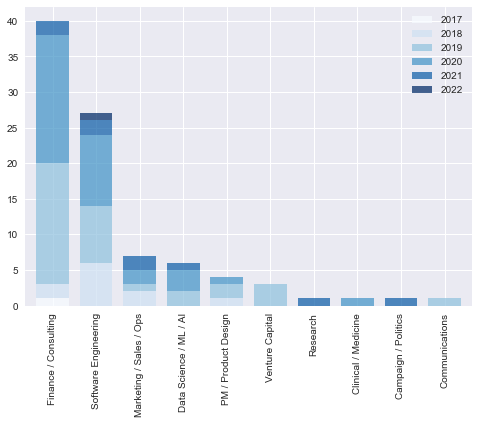
Not only do rising upperclassmen make up more of the more popular intern roles, they also seem to make up less of the less popular roles.
Moving on to the other big industry, technology, while often thought of as less tied to what some might call an ageist agenda, is still right-skewed with respect to graduation year. 2017 grads were not represented, but compared to the others, data science / ML roles seemed to be the most balanced, with three interns in the class of 2020, two in 2019, and one in 2021.
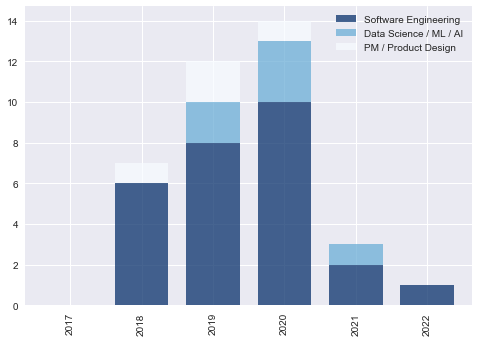
Harvard students might be in it for the return offer, but they also love optionality. A large number of upperclassmen looking for nearer-term future employment might be a good signal for partner companies that students will be interested in learning more and coming to events.
To conclude, while the premise of SummerCamp naturally attracts a subset of Harvard’s wide and diverse student population, our community doesn’t just fit one mold either. Bringing together tech-savvy, curious, and fun-loving minds excited about learning more about what’s out there is what we’re all about, and we definitely couldn’t do it without all the awesome partners involved in our program. Interested in signing up or getting involved? Visit us at summercamp.io!
Joint concentrators (double majors), like those studying Statistics and Computer Science, were counted for both concentrations.
Small discrepancies between this graph and the last come from omitting any records with unfilled majors.